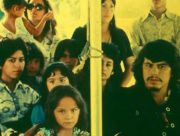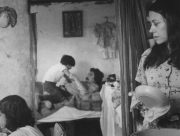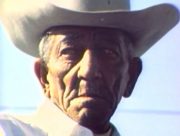Whether your only points of reference for Chicano cinema are films like Zoot Suit and Selena or whether you’re a scholar of all things Chicano on the big screen, BAMcinématek’s upcoming ¡Sí Se Puede! Pioneers of Chicano Cinema program has something for you. Curating those more well-known films alongside pioneering work from Lourdes Portillo and Sylvia Morales among others, the weeklong series serves as a celebration of documentaries and fiction films alike that have championed, questioned, celebrated and come to define Chicano identity over the past five decades. The films created by these bold voices are chronicles both of struggle – against racism, economic exploitation, police abuse – and of a vibrant culture’s history and traditions.
As BAMcinématek programmer Jesse Trussell explains, “These were necessary films at the time, and still resonate to this day, providing a voice and a point of view that are underrepresented in film. The filmmakers in this series are an inspiring generation of artists that moved seamlessly across spaces of activism, art and entertainment. At a time where xenophobia and racism run rampant in America, we can look to the work of these artists for multifaceted, humanist views of Latinx American identity.”
Check out the trailer and the full lineup below, which, yes, obviously includes two Selena-related projects as well as several projects featuring the likes of Edward James Olmos, Jimmy Smits, Lou Diamond Philips, and Esai Morales.
¡Sí Se Puede! Pioneers of Chicano Cinema runs at BAMcinématek, March 16–Mar 22, 2018.
Selena
Almost twenty years after her death, Selena Quintanilla-Pérez is still a musical icon. Known as ‘la reina del tex-mex’ she was the first female artist to have a tejano hit. She sold more than 60 million albums making her one of the most successful Latina singers of all time. The movie memorializing her life, Selena, is iconic in its own right. Starring Jennifer Lopez as Selena, Edward James Olmos as her father, and the late Lupe Ontiveros as her fan club president, the film made millions of dollars at the box office. Directed by Gregory Nava, (El Norte, Mi Familia) it has its melodramatic, telenovela-esque moments and cheesy cutaways to a sparkly full moon and roses but the film is like a gift to her fans, their chance to see her perform one last time. The movie makes it clear that she was at a pivotal moment in her career, that she was about to crossover into the mainstream having just recorded an English-language album. And even though she wasn’t alive to witness it, her posthumous album, “Dreaming of You”, reached number one. Every time I watch it, it makes me tear up and incessantly repeat, “Anything for Suh-lee-nus.”
La Bamba
“The day the music died” and all the events leading up to that fateful day are portrayed through a beautiful narrative in Luis Valdez’s 1987 drama La Bamba. The film stars honorary Latino Lou Diamond Phillips as Ritchie Valens (born Richard Valenzuela), an American singer/songwriter/guitarist who broke through the rock ‘n’ roll ranks to become one of the most exciting new recording artists in 1958 with hits songs such as “Come On, Let’s Go” and “La Bamba.” The writer/director Valdez tells the story of Valens and his breakout success along with his tumultuous relationship with his brother Bob (Esai Morales), who was both proud and a bit jealous of his younger brother’s accomplishments. As most people know, Valens, along with fellow rock ‘n’ rollers Buddy Holly and “The Big Bopper” Richardson, were killed when their chartered airplane crashed on February 3, 1959. Unless you have a heart of steel, the final scenes in La Bamba are some of the most heartbreaking you will ever see. When Ritchie’s mom hears the news of her son’s death and screams out, “Not my Ritchie,” be ready to grab the tissue box.
El Norte
Director Gregory Nava made movie history when his 1983 film El Norte became the first American independent picture to receive an Academy Award nomination for Best Original Screenplay (Places in the Heart won that year). The film, which would be selected only 10 years later for preservation in the U.S. National Film Registry by the Library of Congress, told the three-part story of two Guatemalan immigrants, a brother and sister, who travel north through Mexico in hopes of reaching Los Angeles to start a new life. In the first part of the film, the siblings, Rosa and Enrique (Zaide Silvia Gutiérrez and Ernesto Gómez Cruz), escape Guatemala after their father is killed by government troops and their mother disappears. In the second part, Rosa and Enrique try to cross the Mexican border with the help of a coyote. In the final chapter, the duo makes it to the U.S but find that life is more difficult that what they had expected, especially since they are undocumented. One of most powerful quotes of the film comes when Rosa says, “In our own land, we have no home. They want to kill us. … In Mexico, there is only poverty. We can’t make a home there either. And here in the north, we aren’t accepted. When will we find a home, Enrique? Maybe when we die, we’ll find a home.”
My Family, Mi Familia
With an all-star cast of Latino actors, director Gregory Nava’s independent film My Family, Mi Familia saw the likes of Edward James Olmos, Jennifer Lopez, Jimmy Smits, Esai Morales and the late Lupe Ontiveros coming together to tell the epic three-generation-long story of an immigrant Mexican family living in East Los Angeles from the 1920s to the 1980s. After patriarch José Sanchez (Jacob Vargas) makes his way to California from Mexico and starts a family, the drama unfolds between a host of resonating characters and themes, including personal tragedy, assimilation, and cultural identity. Both Smits and Lopez received Independent Spirit Award nominations for their performances and the film was even nominated for an Academy Award for Best Makeup (it lost to Braveheart). Produced by Francis Ford Coppola, My Family, Mi Familia opened the door for other films about the Mexican-American family experience to be told at the turn of the century, including Real Women Have Curves, Tortilla Soup and Quinceañera. In his review, late film critic Roger Ebert gave the film four stars and said, “Rarely have I felt at the movies such a sense of time and history, of stories and lessons passing down the generations, of a family living in its memories.”
Zoot Suit

Stick around after the screening of Zoot Suit on March 16 for a conversation with director Luis Valdez.
Trailblazing writer-director Luis Valdez’s stage musical was the first by a Mexican-American to bow on Broadway, and his film adaptation was the first to be produced by a major studio. It’s a brash, politically charged retelling of the 1940s Los Angeles Zoot Suit Riots—in which a band of Chicano youths were wrongly accused of murder, setting off a wave of anti-Mexican violence—that illuminates a decisive moment in Chicano history with dazzling invention.
El diablo nunca duerme

In this documentary murder mystery, Chicana director Lourdes Portillo investigates the mysterious death of her multimillionaire uncle Oscar, uncovering, in the process, a hidden history of family secrets, suspicions, and scandals. Portillo interweaves home movies, gumshoe noir style, and fragments of telenovelas to tell what’s both an engrossing true crime tale and an autobiographical X-ray of a Mexican-American family.
Please, Don’t Bury Me Alive!

The very first Chicano feature ever made is an against-all-odds miracle of regional independent filmmaking and a vital record of Mexican-American life in 1970s America. Set in the barrio of San Antonio, Texas, it chronicles the experiences of a young Chicano (director Gutiérrez, who also produced and distributed the film) as he grapples with racism, poverty, and the effects of the Vietnam War on his community.
A Crushing Love

Screens with Sylvia Morales’ Chicana (1979):
A vital corrective to the male-dominated work of much of the Chicano Movement, this watershed alternative history illustrates the contributions of Latina women from the Aztec era to the present, with an emphasis on their roles as revolutionary leaders.
A companion to Morales’ own 1979 short film Chicana, A Crushing Love profiles five contemporary Latina activists, single mothers (Dolores Huerta, Elizabeth “Betita” Martinez, Cherrie Moraga, Alicia Escalante and Martha Cotera) who balance family with their tireless work of advancing Chicano rights.
Raíces de sangre

Screens with Esperanza Vasquez’s Agueda Martinez: Our People, Our Country (1977):
An Oscar-nominated portrait of the celebrated New Mexico artist and weaver Agueda Martinez.
Director Jesús Salvador Treviño had long been active in the Chicano civil rights movement when he made this revolutionary cri de coeur. Set along the Texas-Mexico divide, it’s a hard-hitting, neorealist dramatization of the struggles faced by garment factory workers on both sides of the border as they fight to form an international union—a powerful portrayal of Mexican-Chicano solidarity.
Yo soy Chicano

Screens with José Luis Ruiz’s Cinco Vidas (1972):
The richness and diversity of East Los Angeles’ Chicano community is revealed through profiles of five residents, ranging from a grandmother to law student to a school principal, in this Emmy winning documentary
Director Jesús Salvador Treviño offers a comprehensive view of Chicano history and identity, tracing the culture from its pre-Columbian origins to the political activism of the 1960s and 70s.
CORPUS: A Home Movie for Selena

Screens with Lourdes Portillo and Vilma Coronado’s After the Earthquake (1979):
Portillo’s first film charts the experiences of a young Guatemalan woman (Coronado) as she adjusts to life in Los Angeles, offering an incisive comparison of American and Latin American cultures.
This probing documentary explores the legacy of Selena, the late Tejano music superstar, and her enduring centrality to Chicano culture through rare archival footage and interviews with her family and fans.
Chicano Shorts Movement Program
Of the myriad civil rights struggles that took root in the 1960s, one of the most frequently overlooked is the Chicano Movement, an ongoing fight for political, economic, and cultural recognition, the origins of which are immortalized in these empowering odes to resistance.
I am Joaquin (1969) Dir. Luis Valdez. El Teatro Campesino—the theatrical group founded by Luis Valdez in conjunction with César Chávez’s United Farm Workers—adapt the eponymous poem, a paean to Mexican-American identity that became a rallying cry of the Chicano Movement.
Si se puede (1972) Dirs. Rick Tejada-Flores & Gayanne Fietinghoff.This stirring account of political protest documents a 24-day hunger strike by César Chávez in support of Chicano farm workers’ right to strike.
La raza unida (1972) Dir. Jesús Salvador Treviño.A chronicle ofthe first national convention of La Raza Unida, the grassroots political party established to advance Chicano rights.


